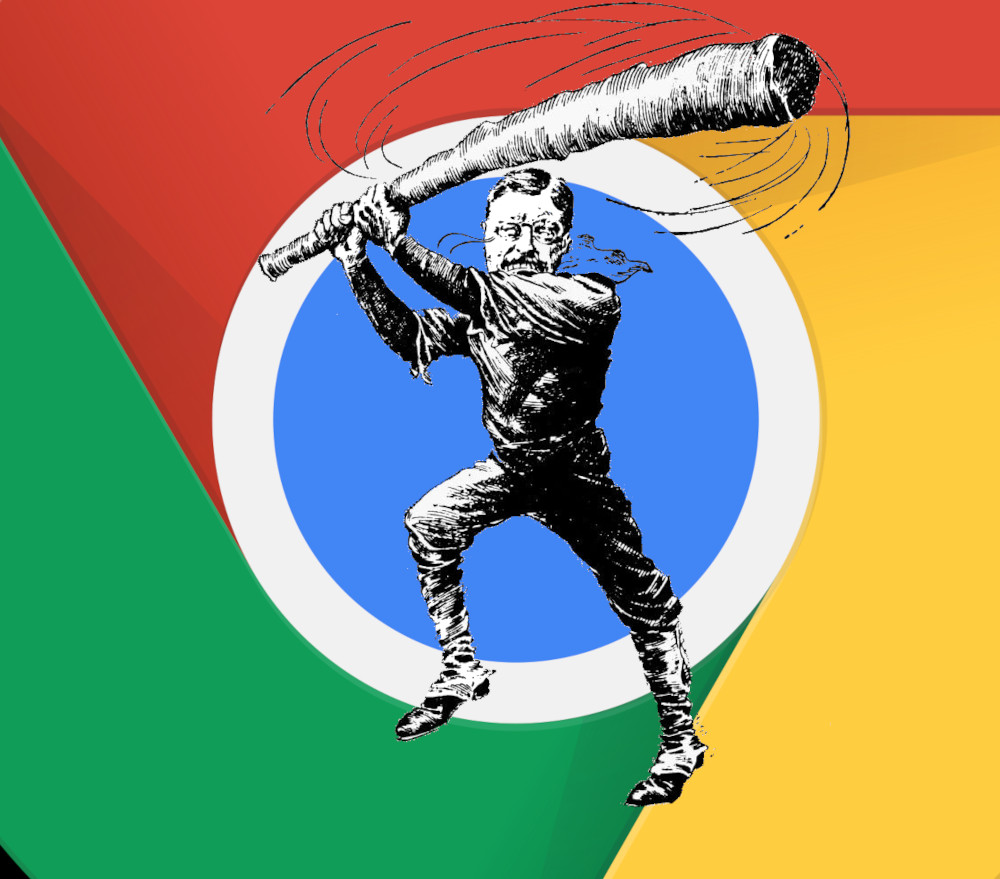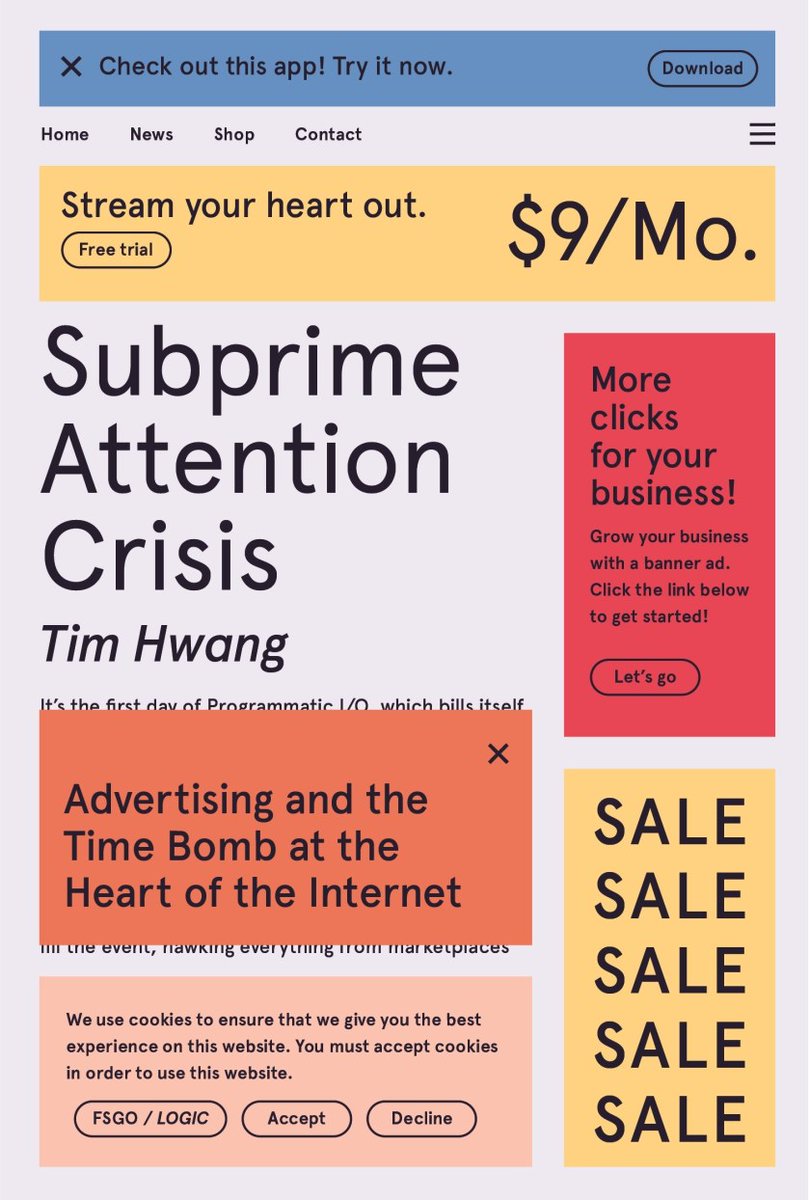There& #39;s a lot of ways to think about the movement to tame Big Tech, but one of the more useful divisions to explore is the "Night of the Comet" people versus the "Don& #39;t Believe the Criti-Hype" people.
1/
1/
(If you& #39;d like an unrolled version of this thread to read or share, here& #39;s a link to it on http://pluralistic.net"> http://pluralistic.net , my surveillance-free, ad-free, tracker-free blog:)
#minatory-legend">https://pluralistic.net/2021/04/11/halflife/ #minatory-legend
(or">https://pluralistic.net/2021/04/1... read on for the rest of the thread, below)
#minatory-legend">https://pluralistic.net/2021/04/11/halflife/ #minatory-legend
(or">https://pluralistic.net/2021/04/1... read on for the rest of the thread, below)
This is a division over the value of the data that Google, Facebook and other large tech firms have amassed over the years - data on their users, sure, but also data on the advertisers and publishers they serve with their ad-tech platforms.
2/
2/
Big Tech companies and their investors are really bullish on the value of this commercial data-advantage: they say that spying on us - the users - lets them manipulate our opinions and activities so that we buy or believe the things their advertisers pay them to push.
3/
3/
More quietly, their investors believe that the data-advantage extends to publishers and advertisers, a deep storehouse of data that makes it effectively impossible for anyone else to do the precision targeted that Big Tech manages, which is why they have such fat margins.
4/
4/
Night of the Comet tech criticism accepts these claims at face value: Big Tech& #39;s advantage, they claim, comes from having amassed this insurmountable data-advantage that allows it to both predict and shape what we - and therefore advertisers and publishers - will do.
5/
5/
The implication of this is that traditional antitrust remedies - breakups, say - won& #39;t be merely ineffective; they& #39;ll be terrifyingly harmful.
6/
6/
If Googbook invented a mind-control ray to sell your nephew fidget-spinners, then breaking them up will only make it easier for Robert Mercer to hijack that mind-control ray to turn your uncle into a Qanon racist.
7/
7/
Googbook& #39;s data-advantage, in other words, is like a planet-killing comet heading towards the Earth. If we break that comet up, it will turn into a killing rain of meteors that shower onto every part of the globe - we can& #39;t break up the comet, we have to STEER it.
8/
8/
In this version of tech criticism, the answer is to leave Big Tech intact, but turn it into a utility, or some other highly regulated entity, bound by rules that limit its use of that mind-control system.
9/
9/
Bringing Big Tech to heel by deputizing it to serve as an arm of the state (and perhaps a national champion in the new Cold War with China), like the Bell System prior to the AT&T breakup in & #39;82.
10/
10/
On the other side, you have the Don& #39;t Believe the Criti-Hype school. @STS_News coined the term "Criti-Hype" to describe a kind of criticism that actually hypes its subject - say, by repeating Big Tech& #39;s self-serving claims.
#dont-believe-the-hype">https://pluralistic.net/2021/02/02/euthanize-rentiers/ #dont-believe-the-hype
11/">https://pluralistic.net/2021/02/0...
#dont-believe-the-hype">https://pluralistic.net/2021/02/02/euthanize-rentiers/ #dont-believe-the-hype
11/">https://pluralistic.net/2021/02/0...
These claims aren& #39;t just self-serving, they& #39;re also highly dubious. Everyone who& #39;s ever claimed to be able to read - or control - our minds was lying (to themselves, or to everyone else, or both).
12/
12/
The "psychometrics" that all this behavior-modification depends on is - to quote @nature - a "scant science." From Big Five Personality Types to microexpression/sentiment analysis, we& #39;re deep into the realm of irreproducible results and junk science.
https://www.nature.com/articles/d41586-018-03880-4
13/">https://www.nature.com/articles/...
https://www.nature.com/articles/d41586-018-03880-4
13/">https://www.nature.com/articles/...
The Criti-Hype school posits that the supernormal returns to capital for Big Tech aren& #39;t driven by awesome ad-tech capabilities, but rather, by monopoly (buying or crushing all competitors) and the fraud it enables (the industry has nowhere else to go).
14/
14/
That is, Big Tech makes money the same way hedge-fund managers make their own stunning returns: by cheating so they get paid whether or not they& #39;re any good at their jobs. The mere existence of a profitable industry is not proof that the industry is run by competent people.
15/
15/
And to be clear, there is a LOT of fraud in ad-tech. @timhwang calls it a "Subprime Attention Crisis," where the ads are fake, the clicks are fake, the publishers& #39; inventory is fake, the whole thing RIDDLED with fraud.
#wannamakers-ghost">https://pluralistic.net/2020/10/05/florida-man/ #wannamakers-ghost
16/">https://pluralistic.net/2020/10/0...
#wannamakers-ghost">https://pluralistic.net/2020/10/05/florida-man/ #wannamakers-ghost
16/">https://pluralistic.net/2020/10/0...
As @Chronotope wrote, "The numbers are fake, the metrics are bullshit, the agencies responsible for enforcing good practices are knowing bullshitters profiting off the fake numbers and none of the models make sense at scale of actual human users."
#adfraud">https://pluralistic.net/2021/01/04/how-to-truth/ #adfraud
17/">https://pluralistic.net/2021/01/0...
#adfraud">https://pluralistic.net/2021/01/04/how-to-truth/ #adfraud
17/">https://pluralistic.net/2021/01/0...
It& #39;s a "bezzle" - a con whose mark hasn& #39;t twigged to the ruse...yet.
And while the Night of the Comet side relies on the irreproducible claims of self-proclaimed Svengalis, the Criti-Hype side has an increasingly corpus of cold, hard facts about the bezzle& #39;s operation.
18/
And while the Night of the Comet side relies on the irreproducible claims of self-proclaimed Svengalis, the Criti-Hype side has an increasingly corpus of cold, hard facts about the bezzle& #39;s operation.
18/
Take last November& #39;s "Why Google Dominates Advertising Markets," @DinaSrinivasan& #39;s superb and detailed dissection of Google& #39;s crooked ad-markets, in which they steal from advertisers and publishers by rigging the bids on both sides of the exchange.
#adtech">https://pluralistic.net/2020/11/20/sovkitsch/ #adtech">https://pluralistic.net/2020/11/2...
19/
#adtech">https://pluralistic.net/2020/11/20/sovkitsch/ #adtech">https://pluralistic.net/2020/11/2...
19/
Srinivasan proves you don& #39;t need mind-control rays to explain how Big G makes fantastic returns from the ad-tech market. That prospect is further explored in @CMAgovUK& #39;s 437-page report on "Online platforms and digital advertising" (Jul & #39;20):
https://assets.publishing.service.gov.uk/media/5fa557668fa8f5788db46efc/Final_report_Digital_ALT_TEXT.pdf
20/">https://assets.publishing.service.gov.uk/media/5fa...
https://assets.publishing.service.gov.uk/media/5fa557668fa8f5788db46efc/Final_report_Digital_ALT_TEXT.pdf
20/">https://assets.publishing.service.gov.uk/media/5fa...
Here& #39;s where it starts to get REALLY interesting. In May 2020, Yale& #39;s @ProfFionasm and Omidyar& #39;s @DavidDinielli used preliminary CMA data to publish their "Roadmap for a Digital Advertising Monopolization Case Against Google."
https://omidyar.com/wp-content/uploads/2020/09/Roadmap-for-a-Case-Against-Google.pdf
21/">https://omidyar.com/wp-conten...
https://omidyar.com/wp-content/uploads/2020/09/Roadmap-for-a-Case-Against-Google.pdf
21/">https://omidyar.com/wp-conten...
Morton and Dinelli zero in on the actual mechanism of Google& #39;s data-advantage, the thing it commands a lion& #39;s share of, which advertisers genuinely prize: location data. If I know you& #39;re around the corner from my cafe, I might spend a LOT to show you an ad for my pasties.
22/
22/
This location data advantage is undeniable, but man, it has a short half-life. Thing is, I might spend a lot of money to show you an ad for my coffee shop when you& #39;re around the corner, but once you& #39;ve moved on, you can go to hell as far as I& #39;m concerned. You& #39;re dead to me.
23/
23/
This short half-life tells us that we& #39;re not living the Night of the Comet nightmare scenario. Break up Google, starve it of location data, and within HOURS most of its location targeting advantage is gone...forever.
24/
24/
As the antitrust cases against Google proceed, more and more of these technical exposes of rigged markets emerge, showing us how monopoly and fraud are at the heart of the data-advantage, and how contingent, time-bound and fragile that advantage really is.
25/
25/
The latest is the bizarrely named "Project Bernanke," a formerly secret ripoff that was exposed when Google forgot to redact a document it filed in its Texas antitrust case:
https://twitter.com/KhushitaVasant/status/1379955848118726659
26/">https://twitter.com/KhushitaV...
https://twitter.com/KhushitaVasant/status/1379955848118726659
26/">https://twitter.com/KhushitaV...
Google used data from recent ad-auctions to help advertisers shade their bids for ad-placements, exploiting the information asymmetry so the ads it brokered won the auctions, ensuring that rivals ad-brokerages were frozen out.
https://www.yahoo.com/entertainment/googles-secretive-project-bernanke-reportedly-093732134.html
27/">https://www.yahoo.com/entertain...
https://www.yahoo.com/entertainment/googles-secretive-project-bernanke-reportedly-093732134.html
27/">https://www.yahoo.com/entertain...
Though Google insists that this was just an industry practice, the leaked document reveals that Google kept this a secret from publishers. Its internal presentations claim that they made $230m in 2013 alone from this practice.
https://www.wsj.com/articles/googles-secret-project-bernanke-revealed-in-texas-antitrust-case-11618097760
28/">https://www.wsj.com/articles/...
https://www.wsj.com/articles/googles-secret-project-bernanke-revealed-in-texas-antitrust-case-11618097760
28/">https://www.wsj.com/articles/...
All together, this constitutes a highly specific account of how a data-advantage worked - and what its weak-point is. Project Bernanke was not grounded in longitudinal market data from ad-sales - it exploited RECENT data to deliver a $230m+/year advantage.
29/
29/
The multisided market - a multisided bezzle - exploits the monopolist& #39;s data advantage to harm readers, publishers and advertisers, not by predicting and shaping their behavior by bypassing their critical faculties with spooky, advanced psychometrics.
30/
30/
The bezzle requires fresh data - it& #39;s a flywheel that uses the monopolist& #39;s god& #39;s-eye-view to freeze out competitors and entrap publishers and advertisers to get more data to rig the market to entrap the publishers and the advertisers.
31/
31/
It& #39;s not a comet. It& #39;s a monopoly. It& #39;s not terrifying supergeniuses using machine learning to turn us into clicking zombies: it& #39;s garden-variety monopolists using anticompetitive, underhanded, dishonest and (probably) illegal tactics to maintain their monopoly.
32/
32/
Bust the trust, ban the conduct, and the data-advantage evaporates with the half-life of that extremely time-bound data. The criti-hype that says that the data-advantage is a deadly, unstoppable comet is just Google& #39;s own sales-patter, flipped on its head.
33/
33/

 Read on Twitter
Read on Twitter





